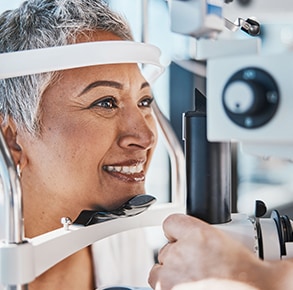In-Depth Care to Elevate Your Quality of Life
So much of our daily lives depends on visual information. From computer work to driving, classroom learning to sports, your visual health can impact how comfortably you perform tasks. Eye health can also help us diagnose and manage conditions that affect your overall health and well-being.
We’re dedicated to providing eye care that supports your quality of life, whether that means helping to alleviate uncomfortable symptoms or maintaining clear vision. We can evaluate, manage, and treat various eye concerns. Book your appointment today so we can discuss your needs.
Request AppointmentWhat Can Eyes Show Us About Overall Health?
Fun fact: The eyes are an organ we can look at inside and out without surgery or intensive scans.
That means comprehensive eye exams can help detect and lead to timely treatment of various conditions, such as autoimmune disease, diabetes, high cholesterol, stroke, and vascular disease. The eyes are a window to your overall health, and we want to help you protect your vision and well-being.


Helping Patients Manage Various Ocular Conditions
Eye health is essential for maintaining good vision and overall well-being. Many common eye conditions, such as cataracts, glaucoma, macular degeneration, and diabetic retinopathy, can significantly impact an individual’s quality of life.
Northwest Vision Source can help you manage your vision and eye health. We perform in-depth assessments, utilize technology, and take the time to understand your concerns. Then, we prescribe treatment and solutions appropriate for your individual health and lifestyle.
Cataracts
Cataracts occur when the eye’s lens becomes cloudy, resulting in blurry or distorted vision.
The primary cause of cataracts is aging, but other factors, such as diabetes, smoking, and prolonged exposure to UV rays (sunlight), can also contribute to their development.
Symptoms
Some common symptoms include:
- Cloudy or blurry vision
- Difficulty seeing at night
- Sensitivity to light
- Seeing halos around lights
Treatment
In early development, prescription glasses or contact lenses can help improve vision. However, when cataracts severely impair vision, cataract surgery is the primary treatment.
Cataract surgery removes the clouded lens and replaces it with an artificial or intraocular lens (IOL). The procedure is generally safe and effective, with most patients experiencing significant vision improvement.
Diabetic Retinopathy
Diabetic retinopathy is a complication of diabetes that affects the blood vessels in the retina, causing them to leak fluid or bleed.
Diabetes also doubles the risk of developing glaucoma and cataracts. As a result, diabetic retinopathy can cause vision loss and, in severe cases, blindness.
Symptoms
Early stages of diabetic retinopathy may not have noticeable symptoms, but as the disease progresses, symptoms can include:
- Blurry or wavy vision
- Dark areas or vision loss
- Floaters or flashes of light
- Poor night vision
Treatment
Treatment for diabetic retinopathy focuses on managing blood sugar levels, blood pressure, and cholesterol to prevent further damage. Laser treatment, injections, or surgery may sometimes be necessary to address the damaged blood vessels and preserve vision.
Glaucoma
Glaucoma is a group of eye diseases that damage the optic nerve, responsible for transmitting visual information from the eye to the brain.
This damage is often caused by increased intraocular pressure (IOP), although other factors can also contribute to it.
Symptoms
Glaucoma often has no early symptoms, but as the disease progresses, individuals can experience:
- Loss of peripheral vision
- Difficulty adjusting to dark rooms
- Central vision loss
- Redness or eye pain
Treatment
Treatment options for glaucoma include prescription eye drops, oral medications, laser therapy, or surgery. These treatments aim to lower eye pressure and slow the disease’s progression, helping to preserve vision.
Macular Degeneration
Macular degeneration, also known as age-related macular degeneration (AMD), is a leading cause of vision loss among adults over 50. It occurs when the macula (central part of the retina) deteriorates over time.
There are 2 types: dry and wet. Dry is the most common type experienced, and it’s slower developing. Wet AMD is less common but can develop rapidly and is an eye emergency. Contact us if you experience sudden changes to vision or eye comfort.
Symptoms
People with early-stage dry macular degeneration typically experience no symptoms. However, it can still affect eye health. Visual symptoms usually begin to occur in the intermediate stage, late stage, and the wet form.
Symptoms can include:
- Increasing blurry or blank spots
- Poor night vision
- Lines appearing crooked or wavy
- Colors appearing dull
Treatment
While there is currently no cure for macular degeneration, certain treatments can help slow its progression and manage symptoms. These may include nutritional supplements, laser therapy, or injections of medications into the eye.
Individualized Care for Your Unique Needs
At Northwest Vision Source, your comfort and well-being are our top priorities. The quality of your vision can change your life, whether it means reducing your reliance on reading glasses or squinting less during screen time. We take the time to listen and understand so we can personalize your care.
Come Visit Us
Our building is in the Reserve Office Park, which is just north of the North May Avenue and 150th Street intersection. Look for the 153rd street sign and turn east into The Reserve Office Park or give our friendly staff a call.

Our Address
- 15302 N May Ave
- Edmond, OK 73013
Contact Information
- Phone: 405-751-7272
- Email: [email protected]
Hours of Operation
- Monday: 8:00 AM – 6:00 PM
- Tuesday: 7:30 AM – 5:00 PM
- Wednesday: 8:00 AM – 5:00 PM
- Thursday: 8:00 AM – 6:00 PM
- Friday: 8:00 AM – 1:00 PM
- Saturday: Closed
- Sunday: Closed
Our Brands




Our Google Reviews
Check us out on Instagram
Error: No feed found.
Please go to the Instagram Feed settings page to create a feed.






